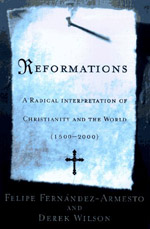 (Reprinted with permission from the Greenwich Time, written by John Linsenmeyer.)
(Reprinted with permission from the Greenwich Time, written by John Linsenmeyer.)
Felipe Fernandez-Armesto and Derek Wilson’s Reformations is perceptive study of Western religious evolution from roughly 1500 to today. The authors, an Oxford don and a Cambridge historian, describe themselves as “an evangelical Protestant of charismatic sympathies sparingly indulged and a Roman Catholic of Tridentine temptations wistfully resisted,” but they meld so smoothly that you would not guess it was a cooperative effort.
The plan of the book is ambitious. Despite recent reports of the death of God and the withering of religion, “today secularism is on the defensive, while religions are back. Christianity, in particular—until recently divided and beleaguered—has made an unprecedented comeback” particularly in Eastern Europe, where “the churches have emerged in strength from the ruins of Communism.” But how did we get from the medieval “age of faith” to where we are now?
Traditionally, Protestants and Catholics have disagreed on the merits of the Reformation. To many Protestants, it was a liberation from a long, dark night of superstition and virtual idolatry. To many Catholics, the rupture in the doctrinal unity of Christianity that tore the unitary fabric of the Christian religion was a catastrophe. The authors disagree with both generalizations and emphasize those experiences that unite rather than divide committed Christians today.
In only one respect does the book fall somewhat short. The authors are products of England’s two leading universities, and write from a Eurocentric standpoint. David Koresh of Waco fame gets half a sentence; Billy Graham about the same. Jim and Tammy Bakker, L. Ron Hubbard, and Aimee Semple McPherson get not a solitary mention. But so what? If you have no interest in religion, there is no point in recommending this book (assuming you have even read this far in the review). But for the rest of us, it is a tour de force.